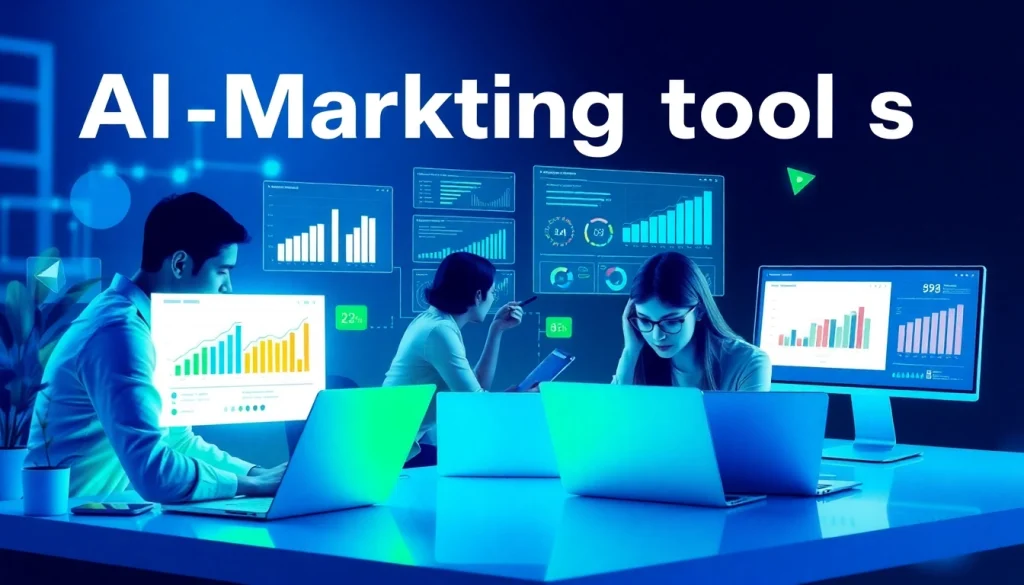
Understanding AI Marketing Tools
In today’s fast-paced digital marketing landscape, businesses must adapt rapidly to consumer behavior changes and technological advancements. One of the most significant developments in recent years is the advent of AI marketing tools, which leverage artificial intelligence to streamline marketing tasks and enhance customer engagement. These tools not only save time and resources but also provide unique insights that can propel businesses ahead of their competition. In this comprehensive guide, we will explore the fundamentals of AI marketing tools, their benefits, and their various applications to elevate your marketing strategies effectively.
What Are AI Marketing Tools?
AI marketing tools encompass a range of software solutions that utilize artificial intelligence to optimize marketing processes. These tools can analyze vast amounts of data, automate repetitive tasks, segment audiences more efficiently, and personalize marketing campaigns at scale. From chatbots that enhance customer service to predictive analytics tools that forecast consumer behavior, the variety of AI marketing tools available today cater to different marketing needs.
Benefits of Using AI in Marketing
The integration of AI into marketing strategies offers numerous benefits:
- Increased Efficiency: AI tools automate repetitive tasks such as data analysis, lead scoring, and customer segmentation, allowing marketing teams to focus on strategy and creativity.
- Improved Targeting: AI algorithms analyze consumer data to identify patterns and trends, enabling businesses to deliver more accurate and personalized communications.
- Enhanced Customer Experience: With AI, brands can provide personalized recommendations, responses, and content, ultimately improving customer satisfaction and loyalty.
- Data-Driven Insights: AI tools can process enormous sets of data quickly, offering actionable insights that drive better decision-making and strategy formulation.
How AI Tools Enhance Customer Experiences
Improving customer experience (CX) is a primary goal for marketers, and AI plays a crucial role in achieving this. By creating a more tailored approach, businesses can enhance customer interactions through:
- Personalized Content Delivery: AI tools help deliver relevant content to users based on their preferences, behavior, and purchase history, increasing engagement.
- 24/7 Customer Support: AI-powered chatbots can handle customer inquiries around the clock, providing instant responses that improve the overall service experience.
- Behavioral Targeting: AI analyzes user behavior to predict future actions, allowing brands to send timely and relevant messages that enhance the likelihood of conversions.
Key Types of AI Marketing Tools
With a plethora of AI marketing tools available, businesses can find solutions tailored to their specific needs. Here are some key categories:
Content Creation and Optimization Tools
Content remains king in the digital world, and AI can assist in content creation and optimization. Tools like Jasper.ai and Surfer SEO are designed to help marketers generate high-quality content efficiently while optimizing it for SEO. These platforms provide suggestions for keywords, structure, and even tone, allowing marketers to create compelling articles and social media posts that resonate with their audience.
Social Media Management Solutions
Social media marketing is essential for engaging with customers. AI tools such as Buffer and Hootsuite streamline social media management by scheduling posts, analyzing engagement metrics, and providing insights into user interactions. These tools offer features to optimize content for different platforms, enhancing the effectiveness of social media campaigns.
Data Analytics and Customer Insights
Understanding customer behavior is critical for effective marketing. AI-driven analytics tools like Google Analytics and Mixpanel assess user interactions across multiple channels. By providing in-depth insights into user demographics, preferences, and behaviors, these tools help marketers tailor their strategies to enhance user engagement and conversion rates.
Choosing the Right AI Marketing Tool for Your Business
Selecting the right AI marketing tool can affect your marketing efficacy significantly. Here are some crucial factors to consider when making your choice:
Assessing Business Needs
The first step is to understand the specific challenges your business faces. Do you need assistance with content creation, customer engagement, or analytics? Identifying your primary marketing needs will help narrow down the tool selection.
Evaluating Features and Pricing
Once you identify your needs, compare the features of potential tools. Look for tools that offer robust functionalities tailored to your requirements, and ensure they fit your budget. Pricing can vary significantly based on features, so it’s essential to evaluate what you’re getting for the investment.
Trial Versions and User Feedback
Before committing, take advantage of free trials or demo versions offered by many AI tool providers. Test the tool’s user interface, functionality, and customer support. Additionally, examining user reviews and case studies can provide insight into the effectiveness of these solutions in real-world scenarios.
Implementing AI Marketing Tools Effectively
Successful implementation of AI marketing tools involves careful planning and execution. Here are best practices to ensure seamless integration:
Best Practices for Integration
Integrate AI tools gradually into existing systems rather than overhauling everything at once. This phased implementation allows for better adaptability and minimizes disruptions. Furthermore, ensure cross-functional collaboration among teams to encourage shared knowledge and greater tool adoption.
Training Your Team
A thorough understanding of new tools is essential for your teams. Conduct training sessions that familiarize team members with both the operational aspects and strategic benefits of the AI tools. Support ongoing education to keep your team updated with tool advancements and best practices.
Measuring Success and Performance Indicators
Post-implementation, it’s vital to define and track performance indicators. Key metrics include increased engagement rates, conversion rates, customer satisfaction scores, and ROI. These metrics will help you assess the tool’s effectiveness and enable continuous optimization of marketing strategies.
The Future of AI in Marketing
The landscape of AI marketing is continually evolving. Staying abreast of emerging trends is essential for businesses looking to maintain a competitive edge. Let’s explore some future directions for AI in marketing:
Emerging Trends and Technologies
Emerging technologies such as advanced machine learning algorithms, AI-driven customer journey mapping, and hyper-personalization are set to reshape marketing strategies. The growth of voice search and virtual assistants will also change how businesses approach SEO and content marketing.
Potential Challenges Ahead
While AI marketing tools offer substantial benefits, challenges exist, including data privacy concerns and the risk of over-reliance on automation. It’s crucial to strike a balance between AI-driven insights and maintaining a personal touch in customer interactions.
How to Stay Ahead in the AI Marketing Landscape
Stay informed about the latest developments in AI marketing technology through continuous learning, networking, and attending industry events. Adaptability is key; regularly reassess your toolset to incorporate innovative solutions that address evolving market demands.
Conclusion
AI marketing tools have transformed how businesses approach their marketing strategies, offering efficiency, personalization, and data-driven insights. By understanding the various types of tools available, choosing the right options for your needs, implementing them effectively, and staying informed about future trends, businesses can leverage AI to enhance their marketing efforts and drive growth. Embracing these advanced technologies is not just an option; it’s a necessity for staying competitive in the ever-evolving digital landscape.






